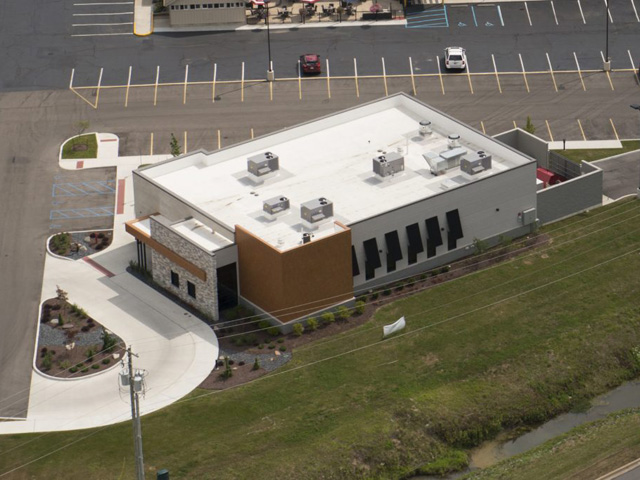Single Ply Roofing
PVC and TPO Single Ply Roofing Systems
There are many options for industrial roofing. If you’re concerned about recurring maintenance and the cost of your cooling bills, there’s the perfect solution for you in PVC and TPO single-ply roofing systems. Both types of roofing materials are simple to install and offer a wide variety of benefits that your building can enjoy.
PVC (polyvinyl chloride) and TPO (thermoplastic polyolefin) are excellent roofing choices. During the installation process, the sheets are welded together using hot air. This gives the seam an incredible amount of strength that can’t be achieved through standard adhesive seals. After all, these adhesives will eventually wear thin due to the weather and chemicals that they’re exposed to. The PVC and TPO materials are also very resistant to tears and punctures due to the polyester scrim that’s on the back of the sheet. All of this adds up to a much more durable industrial roof and lower maintenance costs for you.

Roofing Solutions Since 1973
Preferred Single Ply Roofing Systems for All Industries
PVC (Polyvinyl Chloride)
PVC roofing membranes are known for their high strength (350 pound per square foot minimum breaking strength) durability, and long service life. Additionally, PVC roofing is watertight, flame-retardant, and chemical-resistant.
PVC roofing is an especially good choice for restaurants and food manufacturing facilities that may expose their roofs to fats and oils that could potentially degrade other roofing materials.
TPO (Thermoplastic Polyolefin)
Originally developed as a lower-cost alternative to PVC roofing, TPO roofing membranes are said to combine the UV and heat resistance advantages of EPDM roofing with the convenient hot air weldable properties of PVC. Like PVC, TPO is known to be strong, durable, and energy efficient.
EPDM Rubber
EPDM (ethylene propylene diene terpolymer) rubber is one of the most established types of roofing material currently available for industrial applications. EPDM is an exceptionally shock-absorbent material and as such is an ideal choice for buildings that might be subject to frequent hailstorms. It is also a good choice for roofs that see frequent foot and equipment traffic. Additionally, since EPDM typically does not reflect sunlight, it is recommended for roofs with affixed solar panels.
As EPDM rubber is a petroleum product, it is susceptible to degradation from fats and oils. As such, it may not be the best choice for restaurants and food preparation facilities.
Single-Ply EPDM
Single-Ply EPDM (Ethylene Propylene Diene Monomer) is a highly durable and flexible roofing solution ideal for commercial roofing, industrial roofing, and warehouse roofing applications. Known for its superior resistance to UV rays, extreme temperatures, and weathering, EPDM is a cost-effective choice for low-slope or flat roofs. This lightweight, rubber-based membrane offers excellent longevity, with a lifespan of up to 30 years when properly maintained. Its seamless installation process and low-maintenance requirements make it a popular option for businesses seeking reliable, long-term roofing solutions.
Single-Ply EPDM provides energy efficiency, exceptional waterproofing, and unmatched performance under diverse environmental conditions, making it a smart investment for a variety of roofing needs.
Cool Roof Systems
Another great feature these roofs provide for factory buildings is that they are highly resistant to ultraviolet light. This has given them the deserved nickname of “cool roof systems”. They have an SRI, or solar light reflectance index, of up to 84%. This helps to keep the roof cooler, and in turn, can drastically reduce your cooling bills during the hotter months of the year. Color choice is limited, but the majority of our installations are white to help increase the light reflectiveness even more.

